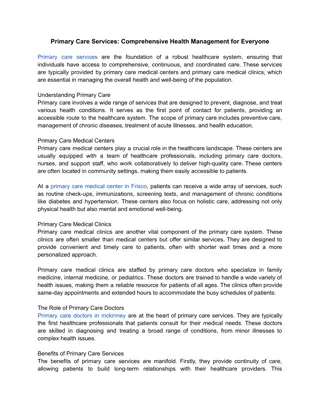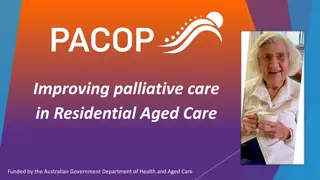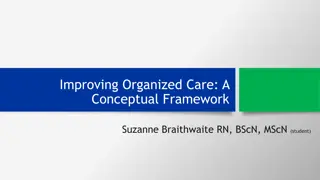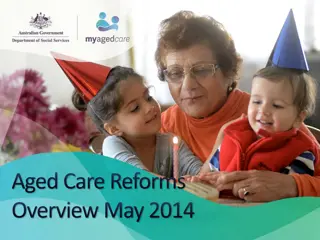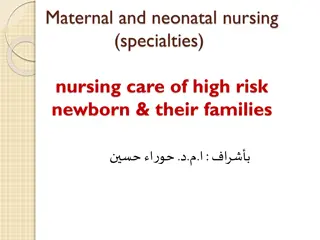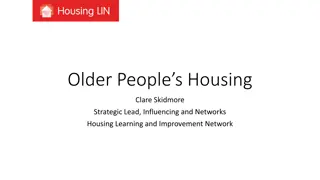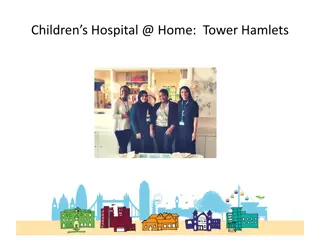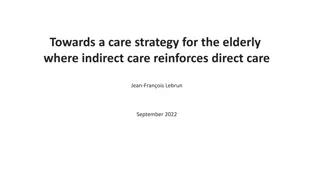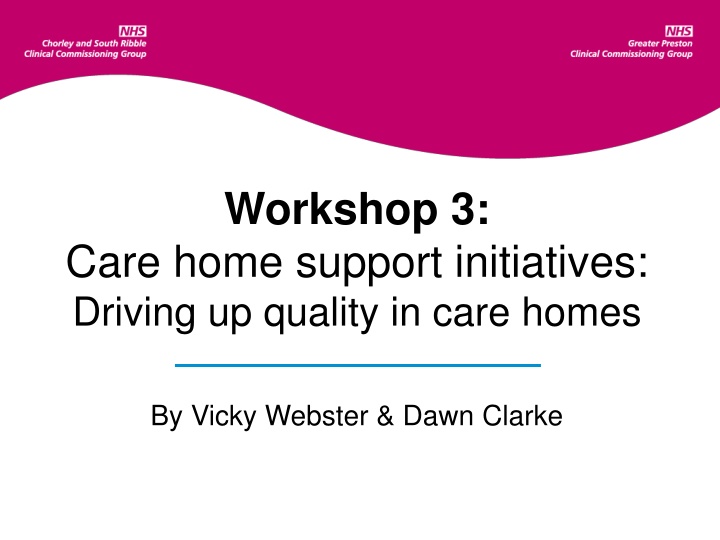
Driving Up Quality in Care Homes: Initiatives for Enhancing Patient Care
Discover how to drive up quality in care homes through cultural initiatives focusing on staff engagement, patient experience, and organizational values. Learn the importance of positive care cultures in improving patient care outcomes and staff morale.
Download Presentation

Please find below an Image/Link to download the presentation.
The content on the website is provided AS IS for your information and personal use only. It may not be sold, licensed, or shared on other websites without obtaining consent from the author. If you encounter any issues during the download, it is possible that the publisher has removed the file from their server.
You are allowed to download the files provided on this website for personal or commercial use, subject to the condition that they are used lawfully. All files are the property of their respective owners.
The content on the website is provided AS IS for your information and personal use only. It may not be sold, licensed, or shared on other websites without obtaining consent from the author.
E N D
Presentation Transcript
Workshop 3: Care home support initiatives: Driving up quality in care homes By Vicky Webster & Dawn Clarke
Background: Culture The NHS belongs to the people It touches our lives at times of basic human need, when care and compassion are what matter most. - The NHS Constitution The system as a whole failed in its most essential duty to protect patients from unacceptable risks of harm and from unacceptable, and in some cases inhumane, treatment that should never be tolerated in any hospital. - Robert Francis QC This Public Inquiry not only repeats earlier findings but also shows wider systemic failings so I would like to go further as Prime Minister and apologise to the families of all those who have suffered for the way that the system allowed such horrific abuse to go unchecked and unchallenged for so long. On behalf of the government and indeed our country I am truly sorry. - The Rt Hon David Cameron MP
Workshop: Culture Why care about culture? 1. We can not make sustainable improvements if people do not engage and the culture is poor! Lessons learned Winterbourne, Francis, Kirkup, etc. More recently Hard Truths, the Journey to Putting Patients First 2. We must work together to prevent another!
What is culture of care? The aim of the culture of care barometer is to ensure: Staff can provide good care to patients Patients have a good experience of their care episode Staff feel valued and satisfied that they are able to raise their concerns when necessary
Workshop: Culture Beliefs and values lead to actions that create a positive care culture Developing a positive care culture. The features of a positive care culture are interconnected and help to facilitate and reinforce each other. Norms of care practice reinforce beliefs, values and actions Positive care culture enables norms and assumptions of care practice
Workshop: Culture Care home support initiatives Key aim: To improve patient care How does cultural change need to be managed to support the successful implementation of such an initiative? Added benefits: To reduce non- elective activity in admissions of older people / people with long term conditions to hospital To improve staff morale Culture is focusing on targets, activities, resources, needs, features, organisational values, etc. that define the identity of their organisation, their role or their service.
Workshop: Culture What did we find? CQC reports require improvements Safeguarding alerts Leadership lack of Recognition that we had people doing a good job Evidence of difficulty recruiting and retaining good nurses Lack of standardisation in the quality of care Closure of one care home
Progress to date Collaboration Care Home Quality Collaborative a task and finish group with multi-agency and multi-disciplinary membership, working together to agree quality measures, initiatives and joint improvements
Progress to date Standardisation Development of research-based recommendations to drive quality improvements Increase of business intelligence tools to inform future developments and standardisation Joint quality assurance framework KPIs being discussed relating to the quality schedule Alignment with regional activity
Progress to date Training and development Online training solutions Training implementation on the priority areas of dehydration and nutrition, pressure area care, falls prevention, MCA / DOLS Scoping of revalidation needs amongst care home nurses
Progress to date Toolkits Care bundles being developed featuring tools and planning packs on a range of areas, including falls prevention, pressure sores and medicines management Phased roll out of hydration tool to all care homes Standard operating procedures for record keeping, safeguarding, professional accountability and incident reporting
Progress to date Sharing networks Forum for advanced nurse practitioners Sharing of best practice and lessons learned Local health and care economy Resilience in the Care Home Sector conference
Progress to date Technology and access Tablets in care homes to enable them to link more closely to GPs Online reporting and feedback mechanisms for care homes, where their feedback can come directly into commissioners Online sharing and collaboration network for care home staff
The benefits Benefits to date: New relationships Better collaboration Agreed vision and principles Common goals and mutual benefits identified Sharing and learning networks Anticipated benefits: Upskilling opportunities A more educated workforce
Impact across the health economy Urgent care transformation programme Step up, step down Ambulatory care Integrated neighbourhood teams Outcomes Reduction in hospital admissions for over 65s Reduction in delayed transfers of care Increase in in number of people > 65 who are at home 91 days after discharge Softer intelligence for quality and performance monitoring * Data validation of achievement is currently outstanding
Project evaluation Feedback from care home staff indicates that they are already feeling more involved as a key and instrumental part of the local health and care economy. The development areas, such as communications systems and information show that this project is on track to deliver the solutions that the sector wants and needs. - Care home staff, 2015 Our engagement with, and support from the CCGs was positive. - Care home staff, 2015
Testimonials The care home quality collaborative Good discussion from different perspectives Shared decision-making Focused and well-led Opportunity to standardise across the local care home economy True collaborative working with multi-agency colleagues
Culture and care Dr Anne Killett
Workshop: Culture http://40.media.tumblr.com/4b7e8174d59ba89e5beae478a8af8cc2/tumblr_nsj53b8OqD1sg5bnlo1_1280.jpg 1. What is the culture like in care homes? 2. How do the following aspects impact on culture: Resources Support Development opportunities Team working / dynamics Values and beliefs Board / proprietors awareness 3. How do you think we can improve culture in our care homes?
Thank you! Any questions?


